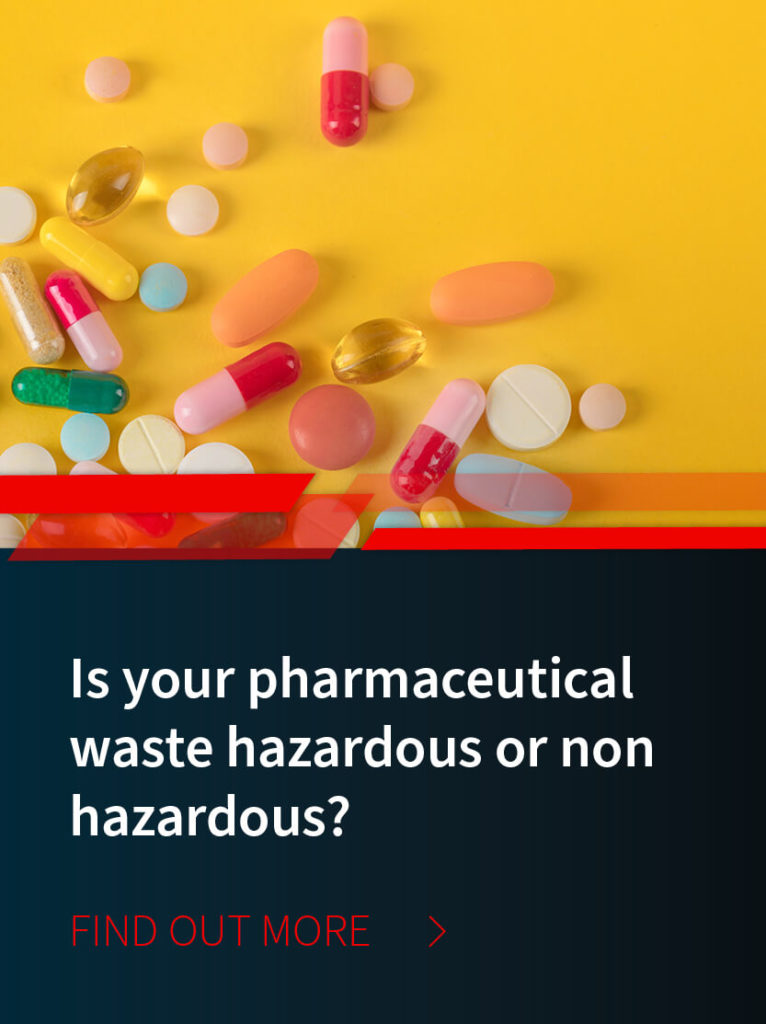
/ IN THIS BLOG
Whether you manage, own, or are in any way responsible for handing medications and/or prescription medications in a hospital, doctor's office, nursing home, or other medical-related facility with pharmaceuticals on-site, you can be sure there will eventually be expired medications that need to be properly dealt with.
Be aware of the regulations regarding disposal of medications, whether they’re expired or not. Strict regulations that govern how you can dispose of expired medications are in place, both on federal and state levels. Don’t put your facility at risk due to improper or unsafe medication disposal processes. One particular area of confusion relates to shipping expired medications to a reverse distributor.
01 / What Is a Reverse Distributor?
The U.S. Drug Enforcement Administration (DEA) defines a reverse distributor as a person or entity that is legally able to accept the return of expired or damaged controlled substances. A reverse distributor must be registered with the DEA.
In a nutshell, a reverse distributor can a person or business that has the authority to collect unsold, expired, or damaged controlled substances and pharmaceuticals. They can then sell them back to the manufacturer for credit. This reverse distribution process is common with pharmaceuticals and medications.
For example, a pharmacy that has expired medications in its inventory can use a reverse distributor to collect and return those out-of-date or otherwise damaged medications to the manufacturer or wholesaler for credit back to the pharmacy. The same applies to physician’s offices, hospitals, care centers, rehab centers and so forth.
It is the responsibility of the reverse distributor to calculate the return credit value of the expired or damaged medications based on product policies of the specific manufacturer. Be aware that controlled substances or hazardous wastes must follow state and federal laws regarding disposal. For information regarding local DEA-registered reverse distributors in your area, contact the DEA’s Local Diversion Field office.
While credits are dependent on the distributor’s policies, a reverse distributor can potentially pay the medical facility something for the expired drugs. On the other hand, they might also charge a small amount for the service. Some fees are charged by reverse distributor services. Fees might be paid in advance or deducted from the credit that is then applied to the seller’s account (pharmacy, hospital, physician’s office, or so forth) that has returned the expired medications.
02 / What Can You Send? What Can't You Send?
What types of medications or pharmaceuticals can a medical provider or pharmacy send back to the drug manufacturer through a reverse distributor? You can send your expired medicines for reverse distribution if they are reusable. This means those medicines have not been opened, used, or contaminated in any way. It is permissible to send those items back to the manufacturer for repackaging.
If the medications have been opened, used, or otherwise compromised, they cannot be sent for reverse distribution. They are considered waste at that point and should be handled as such. This entails proper identification, packing, containerizing, manifesting, and shipping. For hazardous medicines, it also means sending them for incineration.
Carefully review the Environmental Protection Agency’s (EPA) regulations regarding reverse distribution and logistics of hazardous wastes here. Every state also provides guidelines on reverse distribution processes.
Although regulations are in place for proper handling and disposal of expired medications, many hospitals, nursing homes, and other medical facilities do not abide by those rules. Rather than treating the non-usable medicines as waste, they simply send their expired pharmaceuticals and medicines to the reverse distributors. This is in part because some reverse distributors will often take anything. Even though they should only be accepting reusable medications, such is not always the case.
Research your choices for reverse distributors. For starters:
Ensure adequate reporting features that provide clear guidelines or overviews of returnable and non-returnable medicines.
Make sure you understand what is included in any quote you receive for such services. Are there any add-on fees such as shipping costs, shipping labels, or charges for disposal of any non-creditable medicines?
Approved reverse distributors should be able to show you their DEA Form 222 approval to handle and transfer Schedule I and II controlled substances. (Refer to the DEA registration applications, forms, and tools information here.)
Ask the reverse distributor how many drug manufacturers with whom they do business. Verify their success in tracking, collection of, and documentation of credits from various manufacturers.
Be informed. Obey the regulations to maintain compliance and avoid violations!
03 / A Word about Violations
Improper permits, approvals (from the DEA) and lack of documentation are among the most common violations that occur with reverse distributors. Remember that any reverse distributor that you choose to handle your expired but un-used medications must have not only permits from the DEA, but also follow federal and state laws regarding hazardous pharmaceutical wastes. Turn to the EPA for details regarding hazardous pharmaceutical waste management to ensure compliance.
Large shipping companies often transport these hazardous items, but to be in legal compliance, every company handling that waste must be fully permitted during every leg of the journey. Unfortunately, this is sometimes not the case.
Some violations are even as egregious as simply dumping waste medicines down the drain, where they can eventually find their way into the water supply. This is illegal. If it is discovered that such an infraction has occurred, be aware that you will be held responsible. Fines for such behavior ranges $10,000 to $25,000 per day, per violation. Jail time might also be applicable.
Today, strict enforcement reduces improper disposal of pharmaceutical waste. Those found to be non-compliant can and do face massive fines and damage to reputation. The attention paid to environmental protection today is not to be underestimated, and convictions of illegal ‘dumping’ or disposal of drugs – whether you are aware of such infractions of the shipper or transporter of those drugs or not. The ‘buck stops here’ repercussions also applies to the waste generator.
04 / The Cradle-to-Grave Approach
Determination of culpability in the mishandling of expired medications or pharmaceuticals today is on the generator. That means you. It’s called the cradle-to-grave approach to hazardous pharmaceutical waste management. That means that in this case, the pharmacy or pharmaceutical waste generator has the sole responsibility to make sure that their wastes are being properly disposed of or returned to manufacturers.
The Resource Conservation and Recovery Act (RCRA) of 1976 states that the generator (hospital, manufacturing site, doctor's office, etc.) is ultimately responsible for all waste material and its proper disposal. The group accepting the expired medicines could conceivably get in trouble, but the majority of the burden currently rests with the generator.
It’s important to know the laws for reverse distribution and all pharmaceutical waste management processes. Yes, the regulations can be confusing and often vague, but you have options. Turn to the experts at MCF Environmental Services for help when it comes to your pharmaceutical waste management.
For more information about the protocols related to expired pharmaceuticals and reverse distribution, contact one of our knowledgeable representatives today. We are a full-service waste management company with over three decades of experience in healthcare and hazardous waste management. MCF Environmental Services serves states throughout the country.
Robert Losurdo
President, COO








